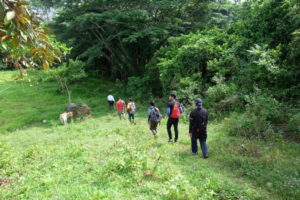
The Center for Conservations Innovations Inc. team doing field work at the Kan-Irag area in Cebu City. CONTRIBUTED PHOTO
Ayala Land partners with SWCF to turn Cebu site into a carbon forest
Some property developers are adopting green designs or practices in their development projects as their way to help the environment and help lessen the impact of climate change.
But property giant, Ayala Land Inc. (ALI), is taking these green initiatives a step further — developing “carbon forests”— an area where landscapes will be improved in an effort to help reduce carbon emissions in the world.
Cebu is one of the five areas that the ALI has chosen to develop a “carbon forest,” specifically the 65-hectare Kan-Irag Nature Park in Barangays Pung-ol Sibugay and Sirao in Cebu City.
Anna Maria Gonzales, ALI’s sustainability manager, said that they would be partnering with the Soil and Water Conservation Foundation Inc. (SWCF) in implementing several projects to help improve the Kan-Irag area.
“SWCF will rehabilitate the landscape inside the protected area, improving wildlife habitats, water infiltration, slowing erosion while enhancing the growth of native species,” Gonzales told Cebu Daily News.
ALI recently announced its plan to convert 450 hectares of land area in five different sites all over the country into carbon forests in line with their target to neutralize the carbon emissions of their properties by 2022.
Aside from Kan-Irag, the other identified carbon forests are Alaminos, Laguna (133 hectares); Sicogon, Iloilo (148 hectares); Lio, Palawan (50 hectares); and Talomo, Davao (54 hectares).
To date, all five areas are estimated to store 68,000 metric tons of carbon dioxide (CO2).
ALI is setting aside P42 million for the project, which is expected to start this year, until 2022. Gonzales said the amount is not as high as they thought, but the benefits from the project will be huge.
Partners
For Kan-Irag, the project will be started within the first quarter of the year.
Gonzales said that while their major implementing partner will be SWCF, who will be doing the assisted natural regeneration (ANR) activities, they will also be closely coordinating with other local stakeholders.
“The local community will likewise be involved in SWCF’s ANR activities as they will be trained by SWCF to aid the ANR activities on site, generating income as they are hired for project implementation,” she said.
Among the ANR activities to be conducted in the area are nursery establishment, firebreak establishment, gathering of wildlings, enrichment planting, and volunteer mobilization.
They will also be coordinating with the local government units and the barangays while ALI’s subsidiary Cebu Holdings Inc. (CHI) will also be involved in the project implementation.
ANR
Gonzales said one of the reasons why the project’s cost is not as high is because they are partnering with non-government organizations (NGOs).
SWCF, ALI’s partner for the Cebu project, was established in 1985 as an informal network of persons of several nationalities “concerned with the global ecological challenge and the necessity of broad-based local initiatives to respond to that challenge,” based on their website.
The group has been doing projects in natural resource management all over the country.
Among SWCF’s program thrusts are advocacy and environmental education, protected area management, livelihood for rural communities, natural resource management, and Karst management.
Aside from partnering with NGOs, Gonzales said they are also using ANR technique, a forest management program extensively used in Southeast Asia but was successfully pioneered by local NGO Pag-ASA Foundation in Bohol.
“If you leave any forest alone, it’s possible to grow back into a forest. With ANR, we recognize that the area has trees growing in it because of birds and wildlife planting the seeds, but we’re nurturing that ability of an area to bounce back or grow on its own by actually protecting what’s already naturally growing there,” Gonzales said in an earlier press briefing in Manila.
Together with the Center for Conservation Innovations, Inc (CCI), a study was conducted to determine the baseline carbon stock in these carbon forest sites.
But while the carbon forests project is one of ALI’s efforts to achieve their carbon neutrality target, Gonzales said they are using a combination of strategies on this.
She said they are also implementing passive cooling designs in their developments, energy efficiency, and renewable energy sourcing.
“ALI’s carbon forest sites are expected to augment ALI’s total carbon emission reduction by approximately 20 percent year-on-year. Through a process called carbon sequestration, the carbon forest sites remove CO2 from the atmosphere. Although forests do release CO2 from their natural processes, a healthy forest typically stores carbon more than it releases it,” Gonzales explained.
After CO2 is converted into organic matter through photosynthesis, carbon is stored in forests for a period of time in a variety of forms before it is eventually returned to the atmosphere though respiration and decomposition.
Carbon footprint
ALI hopes that by 2022, they will be able to offset 490,000 metric tons of CO2.
This amount is equivalent to the estimated carbon footprint arising from the fuel used in construction activities, generators, and use of energy in its numerous developments.
As of now, renewable energy only accounts for 10 percent of ALI’s initiatives to attain carbon neutrality. But by 2022, they target it to account for 80 percent already.
By establishing the discipline and prioritizing approaches that will keep CO2 emissions in check, Gonzales said ALI sought to create a new kind of value for environment and for society by making up for the carbon footprint in its 55 real estate hubs all over the country.
“This is our way of giving back to the planet, for giving us the natural capital that we have benefited from through all these years,” she said.
ALI, a leading developer of large-scale, mixed-use estates, has been integrating sustainability in its operations.
In 2017, ALI advanced its sustainability goals by embarking on a significant carbon emissions offsetting program – becoming the first Philippine company to target carbon neutrality by 2022.